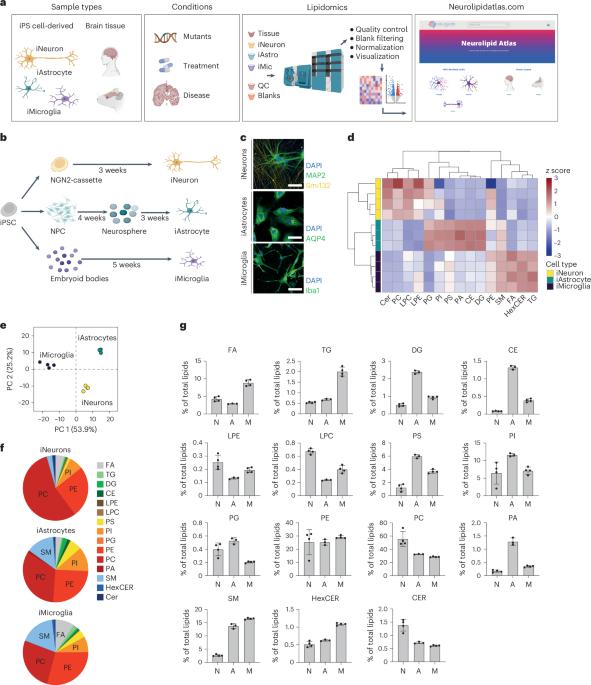The Neurolipid Atlas: a lipidomics resource for neurodegenerative diseases
IF 20.8
1区 医学
Q1 ENDOCRINOLOGY & METABOLISM
引用次数: 0
Abstract
Lipid alterations in the brain have been implicated in many neurodegenerative diseases. To facilitate comparative lipidomic research across brain diseases, we establish a data common named the Neurolipid Atlas that we prepopulated with isogenic induced pluripotent stem cell (iPS cell)-derived lipidomics data for different brain diseases. Additionally, the resource contains lipidomics data of human and mouse brain tissue. Leveraging multiple datasets, we demonstrate that iPS cell-derived neurons, microglia and astrocytes exhibit distinct lipid profiles that recapitulate in vivo lipotypes. Notably, the Alzheimer disease (AD) risk gene ApoE4 drives cholesterol ester (CE) accumulation specifically in human astrocytes and we also observe CE accumulation in whole-brain lipidomics from persons with AD. Multiomics interrogation of iPS cell-derived astrocytes revealed that altered cholesterol metabolism has a major role in astrocyte immune pathways such as the immunoproteasome and major histocompatibility complex class I antigen presentation. Our data commons, available online ( https://neurolipidatlas.com/ ), allows for data deposition by the community and provides a user-friendly tool and knowledge base for a better understanding of lipid dyshomeostasis in neurodegenerative diseases. The authors introduce the Neurolipid Atlas, a dynamic resource for the community to gain insight into lipid alterations in neurodegenerative disease, and they leverage the platform to show how cholesterol alterations in astrocytes can dysregulate neuroinflammatory pathways in Alzheimer disease.

神经脂质图谱:神经退行性疾病的脂质组学资源。
脑脂质改变与许多神经退行性疾病有关。为了促进跨脑疾病的比较脂质组学研究,我们建立了一个名为神经脂质图谱的数据,我们预先填充了不同脑疾病的等基因诱导多能干细胞(iPS细胞)衍生的脂质组学数据。此外,该资源还包含人类和小鼠脑组织的脂质组学数据。利用多个数据集,我们证明了iPS细胞衍生的神经元、小胶质细胞和星形胶质细胞表现出不同的脂质谱,这些脂质谱概括了体内的脂肪类型。值得注意的是,阿尔茨海默病(AD)风险基因ApoE4在人类星形胶质细胞中特异性地驱动胆固醇酯(CE)积累,我们也在AD患者的全脑脂质组学中观察到CE积累。对iPS细胞衍生的星形胶质细胞的多组学研究显示,胆固醇代谢的改变在星形胶质细胞免疫途径中起重要作用,如免疫蛋白酶体和主要组织相容性复合体I类抗原呈递。我们的数据共享,可在线获得(https://neurolipidatlas.com/),允许社区存储数据,并为更好地理解神经退行性疾病中的脂质失衡提供用户友好的工具和知识库。
本文章由计算机程序翻译,如有差异,请以英文原文为准。
求助全文
约1分钟内获得全文
求助全文
来源期刊

Nature metabolism
ENDOCRINOLOGY & METABOLISM-
CiteScore
27.50
自引率
2.40%
发文量
170
期刊介绍:
Nature Metabolism is a peer-reviewed scientific journal that covers a broad range of topics in metabolism research. It aims to advance the understanding of metabolic and homeostatic processes at a cellular and physiological level. The journal publishes research from various fields, including fundamental cell biology, basic biomedical and translational research, and integrative physiology. It focuses on how cellular metabolism affects cellular function, the physiology and homeostasis of organs and tissues, and the regulation of organismal energy homeostasis. It also investigates the molecular pathophysiology of metabolic diseases such as diabetes and obesity, as well as their treatment. Nature Metabolism follows the standards of other Nature-branded journals, with a dedicated team of professional editors, rigorous peer-review process, high standards of copy-editing and production, swift publication, and editorial independence. The journal has a high impact factor, has a certain influence in the international area, and is deeply concerned and cited by the majority of scholars.
 求助内容:
求助内容: 应助结果提醒方式:
应助结果提醒方式:


